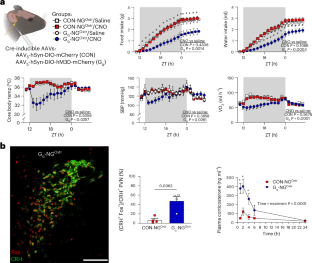支配肠道和心脏的机械敏感神经元控制着代谢和情绪状态
IF 18.9
1区 医学
Q1 ENDOCRINOLOGY & METABOLISM
引用次数: 0
摘要
身体与大脑的交流深刻地影响着生理和行为。表达催产素受体的感觉神经元将肠道和心脏的机械拉伸传递给大脑。令人惊讶的是,这些神经元的同时放电可靠地引发了一种类似于麻木的低代谢状态。这些观察结果可能具有从心脏代谢治疗到太空旅行的各种意义。本文章由计算机程序翻译,如有差异,请以英文原文为准。


Mechanosensitive neurons innervating the gut and heart control metabolic and emotional state
Body-to-brain communication profoundly affects physiology and behaviour. Sensory neurons that express oxytocin receptors relay mechanical stretch of the gut and heart to the brain. Surprisingly, simultaneous firing of these neurons reliably elicits a hypometabolic state that resembles torpor. These observations could have implications ranging from cardiometabolic therapeutics to space travel.
求助全文
通过发布文献求助,成功后即可免费获取论文全文。
去求助
来源期刊

Nature metabolism
ENDOCRINOLOGY & METABOLISM-
CiteScore
27.50
自引率
2.40%
发文量
170
期刊介绍:
Nature Metabolism is a peer-reviewed scientific journal that covers a broad range of topics in metabolism research. It aims to advance the understanding of metabolic and homeostatic processes at a cellular and physiological level. The journal publishes research from various fields, including fundamental cell biology, basic biomedical and translational research, and integrative physiology. It focuses on how cellular metabolism affects cellular function, the physiology and homeostasis of organs and tissues, and the regulation of organismal energy homeostasis. It also investigates the molecular pathophysiology of metabolic diseases such as diabetes and obesity, as well as their treatment. Nature Metabolism follows the standards of other Nature-branded journals, with a dedicated team of professional editors, rigorous peer-review process, high standards of copy-editing and production, swift publication, and editorial independence. The journal has a high impact factor, has a certain influence in the international area, and is deeply concerned and cited by the majority of scholars.
 求助内容:
求助内容: 应助结果提醒方式:
应助结果提醒方式:


